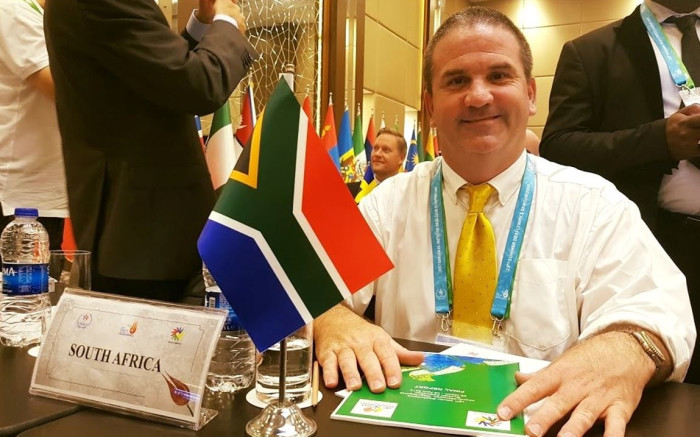Para-swimming legend Slattery hopes for better support for athletes
Para-swimming legend Slattery hopes for better support for athletes
Eyewitness News caught up with retired international swimmer, Tadhg Slattery, who is currently a full-time swimming coach for the disabled at the Mandeville Swimming Club in Johannesburg, and chatted to him about life after being a Paralympic star.
South African Paralympic Swimming champion and coach Tadhg Slattery. Picture: Facebook
JOHANNESBURG – The year is 1992 and the world is taking part in or watching the Paralympic Games in Barcelona.
South Africa is 27th on the medal table with eight medals – four gold, one silver and three bronze medals.
And one of the gold medals won in swimming is by Tadhg Slattery in the 100m breaststroke SB5 category.
The then 20-year-old was making his debut at the Paralympic Games – he finished fourth in his heat in the 50m freestyle, eighth in the final of the 50m butterfly, seventh in his heat of both the 100m and 400m freestyle.
Slattery went on to represent South Africa at six Paralympic Games, bagging two gold medals, two silvers and a bronze.
If you are old enough, you will remember Tadhg Slattery making the headlines for singing the national anthem in sign language after winning gold in the 100m breaststroke SB5 during the 2004 Paralympic Games held in Athens, Greece.
#TeamSA Paralympic Royalty
Former Swimming world record holder & multiple medalist @TadhgSlattery & Wheelchair Basketball legend @leonfleiser are poolside at the Tokyo Aquatics Centre this morning #Tokyo2020#Paralympics #BringingBackUbuntu pic.twitter.com/DBwEu4YU2G
Team South Africa (@TeamSA2020) August 28, 2021
Eyewitness News caught up with the retired international swimmer, who is currently a full-time swimming coach for the disabled at the Mandeville Swimming Club in Johannesburg.
“Transitioning from being an athlete to a coach wasn’t easy, especially as I’m a deaf individual in a hearing world. I mean from a communication perspective, it’s a learning curve and I continuously try to break down the barriers,” Slattery said.
Slattery, who has cerebral palsy and is deaf, attended the 2021 Tokyo Paralympic Games as a coach and the man who had been swimming since he was seven-years-old said that he was nervous at the Games and hoped that his experience would benefit his athlete.
“I was extremely nervous, hoping that with my experience I could make a difference by being supportive and preparing my swimmer mentally and through sharing the same adrenaline,” he explained.
The man who carried the flag at the Paralympic Games in Beijing said that although the lockdown due to COVID-19 was frustrating, the lack of support or funding ahead of the Tokyo Games was worse.
“During lockdown, we couldn’t use the pool to continue with our training. We also struggled with finances, I can’t speak for other athletes and coaches, but we had no funding or support and all our training sessions, transport etc came out of our limited funds.
“We had no funding for a training camp to prepare our swimmers. Then we had to deal with the short notice announcement regarding who would attend Paralympics.”
#GSSA2016 Coach of the Year – @TadhgSlattery #Swimming Visit https://t.co/dUs9KpcSzK for more photos* pic.twitter.com/Y0lGLz3ysk
Jumping Kids (@JumpingKidsSA) March 5, 2016
Slattery said that it was lucky that he and his swimmer made it to the Paralympics before their funds ran out, but he was also heartbroken that not one medal come out from the para-swimming team at the Games.
“It is rather disappointing that for the first time, swimming did not win any medals. athletics and cycling won medals, only 5 out 34 athletes won 7 medals. We have no medals from other sports such as archery, equestrian, swimming, table tennis, wheelchair tennis and I blame that on the huge psychological impact of the pandemic for all sportsmen/women and the lack of financial support,” he said.
The former world record holder and coach at Mandeville Swimming Club said that his greatest achievement as a coach is seeing his swimmer growing and advancing from national level to international level.
“The Mandeville Para Swimming Club (MPS) Learn to Swim programme continues to be the basis of the club. Development and advanced squads evolve from this programme and some swimmers have gone on to achieve national and international honours. Since inception, this programme has seen over 250 black physically disabled and deaf children learn the basics of swimming.
“MPS advanced swimmers have broken thirteen Africa records which all still stand. Additionally, they have broken fifty South Africa records, many of which still stand,” Slattery said.
Coach Slattery said that the MPS Learn to Swim programme produced some of the best black para-swimmers in the country such as Sibusiso Mogale, Dimakatso Makgakga and James Willer.
“South Africa’s first black male international para-swimmer was Sibusiso Mogale. Sibusiso won the 100m breaststroke SB7 gold medal at an international championship in Sheffield, UK in 2008. South Africa’s first black female para-swimmer to succeed at the Swimming SA Senior National Aquatic Championships was Dimakatso Makgakga. Dimakatso won the 50m butterfly gold medal at the South Africa Senior Nationals Championships, 2015. And James Willer was the first black male para-swimmer to succeed at the Swimming SA Senior National Aquatic Championships. James won the 100m freestyle gold medal at the 2021 Champs,” the coach added.
Athletes across the globe are gearing up for Paris 2024, with the French capital is scheduled to play host to the next Paralympics from 28 August to 8 September in 2024.
Slattery is hoping for better support for para-athletes ahead of the Paris Games.
“It would be great to have better financial support for potential athletes to cover transport, training, nutrition, physiotherapy, psychology. Most, if not all, have to pay out of their pockets or hard-earned savings,” he said.
For all the latest Sports News Click Here

